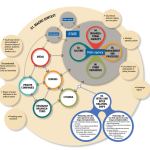Putting data into context
This article was originally published by Research Information, republished here with their permission.
Anne Powell responds to an article in Research Information as she reflects on why predictions on library budget increases in developing markets need to be treated with caution.
A recent article in Research Information, with the headline ‘Libraries in developing markets to see biggest budget increases‘ summarized a recent piece of research by Publishers Communication Group. This story and the research it reported on made me think about the use of numbers and how these need to be applied in context, which ties in strongly with INASP’s first principle of responsible business engagement about understanding the country context.
It is always good to read positive stories about the role of libraries in Africa (and other developing regions). However, we are well aware that there are disparities between countries, and indeed between institutions within each country, which a report on this scale, with limited sampling, has not been able to acknowledge.
I recognize that the numbers provided in the full report are predictions, so there are the usual caveats in that predictions may not materialize. The number that really interests us is the prediction that ‘libraries in the Middle East and Africa region expect the highest levels of budget growth at 4.2 per cent’. This sounds really encouraging – it is great to see confidence in libraries.
However, it is worth drilling down on this number a bit. Not only are there wide differences between the Middle East and Africa, this group includes two countries classified as ’emerging’ – South Africa and Turkey. Thus, from the 22 institutions surveyed in this group, 12 are from emerging countries, and a further seven from Israel and Saudi Arabia, which OECD ranks as high income countries. INASP is familiar with several hundred institutions across Africa, the majority of which do not see annual budget increases anywhere near as high as 4.2 per cent. When one considers that 25 African countries are still categorized as ‘low income’, it becomes clear that these examples do not provide a full picture of library budgets in the region as a whole.
We also need to think what the base budgets may be – 4.2 per cent of very little is still very little. As my colleague Joel Sam, Director, Council for Scientific and Industrial Research-Institute for Scientific and Technological Information (CSIR-INSTI), Ghana, said at last year’s Publishers for Development meeting ‘economic indicators may not reflect the actual situation on the ground. When the economic situation is not analyzed robustly it has led to price quotations well above the means of the country’.
The predicted 2016 4.2 per cent increase in library budgets is still a decrease over the predicted 6.8 per cent increase last year. I’ve just returned from the annual meeting of the Society for Scholarly Publishing, where Canadian librarians were saying how much they have been affected by the strong US dollar – in real terms, their budgets have shrunk considerably. This effect is felt even more strongly in countries like Kenya, where the budget in shillings is increasing, but their buying power in US dollars is decreasing.
While this report sounds very positive, in that libraries in the ‘Middle East and Africa’ look set to increase their numbers of electronic journal title subscriptions, the reality is not as simple. Within the consortia that INASP works with, any corresponding price increases are likely to result in cancellations as their budgets do not conform to the blanket picture described, and are more likely to be static.
The report reminded me to approach numbers with caution; one must continue to consider different contexts even when faced with ‘data’. The publishers we work with cover huge markets, but in order to develop these markets sustainably and work more responsibly they need to think small, consider context, and act (and price) accordingly.
To discuss issues like this in more detail, join INASP and the Association of Commonwealth Universities at the Publishers for Development conference in Oxford on the 28 June. Click HERE to register. You can also see this video to get a flavour of last year’s discussions and keep up-to-date with discussions by following #pfd2016 on Twitter.

 Next Post
Next Post


